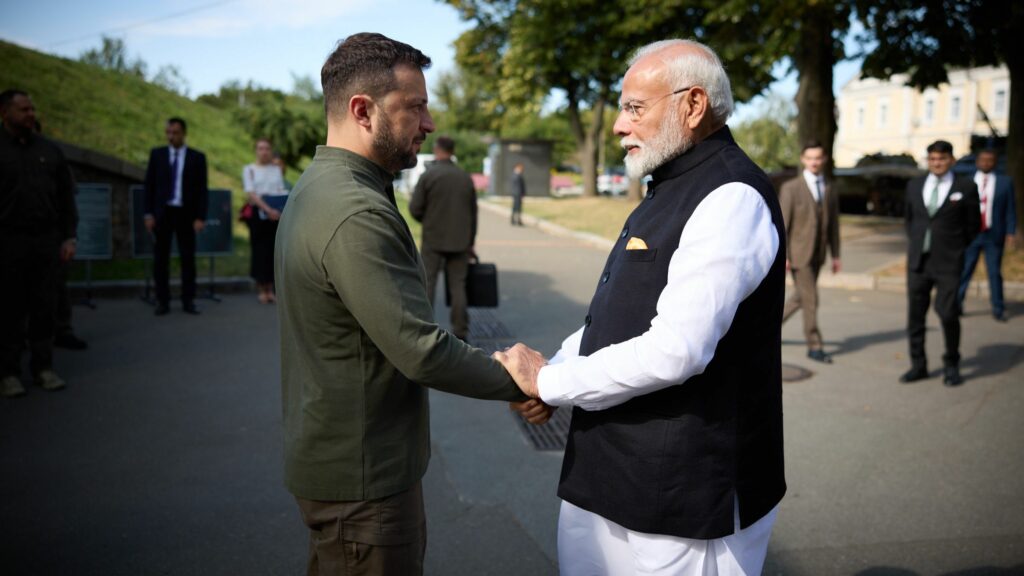
- Prime Minister Modi’s visit to Ukraine is a comprehensive bilateral trip aimed at further enhancing and strengthening the ongoing relationship between the two nations.
- India’s relationship with Ukraine has always been independent, with no influence from Russia or any other country.
- The visit is also significant given the background of India’s strong ties with Russia, which has been noted by Ukrainian officials.
For the very first time since Russia launched its special military operations in Ukraine, the Indian Prime Minister has visited Ukraine. Prime Minister Modi’s visit to Ukraine comes just one month after he visited Russia, which raised many eyebrows and even drew criticism. The criticism came from none other than the Ukrainian presidency, which called the Indian Prime Minister’s visit to Russia a “wrong precedent.” The Ukrainian President expressed disappointment, stating that it was disheartening to see the leader of the world’s largest democracy meeting with a dictator and an invader.
Prime Minister Modi’s visit to Ukraine is a comprehensive bilateral trip aimed at further enhancing and strengthening the ongoing relationship between the two nations. It is expected that during this visit, the Indian and Ukrainian heads of state will sign multiple agreements on topics such as defence, economy, and business. This trip has a broad agenda and highlights India’s significant progress in foreign policy. What was once a policy of non-alignment has now evolved into one of multi-alignment.
India’s relationship with Ukraine has always been independent, with no influence from Russia or any other country. India enjoys a similarly independent relationship with Russia. Ukraine has traditionally been a very important partner for India, ranking among India’s top 50 largest economic partners. The trade turnover between India and Ukraine stands at nearly $3.2 billion. In terms of defence, there have been many agreements between the two countries in the past, and numerous opportunities still exist. However, due to the war over the last two and a half years, the relationship has stagnated, partly due to India’s neutrality, which the Ukrainian government has not fully accepted.
Prime Minister Modi’s visit to Ukraine follows his recent visit to Poland, reflecting India’s growing strategic interest in the region. India is keen on increasing trade with European countries, recognizing significant opportunities in building relationships with one of Europe’s largest countries, Ukraine. This engagement is expected to be advantageous for India.
In terms of diplomacy and dialogue, the Indian government has consistently demonstrated its commitment to finding solutions in Ukraine. Prime Minister Modi has reaffirmed multiple times in his previous meetings with Ukrainian leadership that India is doing its utmost to support efforts for resolution. This visit not only underscores India’s intention to promote peace and stability in the region but also sends a strong message globally about India’s commitment to international issues. India seeks to balance its relationships and is not aligning itself with any particular side. The visit is also significant given the background of India’s strong ties with Russia, which has been noted by Ukrainian officials.
The Ukrainian government believes that Prime Minister Modi’s relationship with President Putin could help in ending the war.
Prime Minister Modi’s visit to Ukraine comes at a crucial time, as Ukraine has launched a counter-invasion on Russia and tensions between the two countries are at an all-time high. The Ukrainian government needs to recognize that this visit could have a significant impact and influence international perspectives on the conflict. For Ukraine to effectively end the war, a pragmatic approach is needed, particularly in terms of diplomatic negotiations. The Ukrainian government must understand that achieving a lasting resolution requires more than temporary gains; it necessitates strategic and practical policies. If Ukraine wants meaningful change, it must adopt a realistic stance and engage constructively with international partners, including India.
Aayush Pal is a freelance writer on contemporary geopolitical developments. The views expressed in his work are entirely his own.
